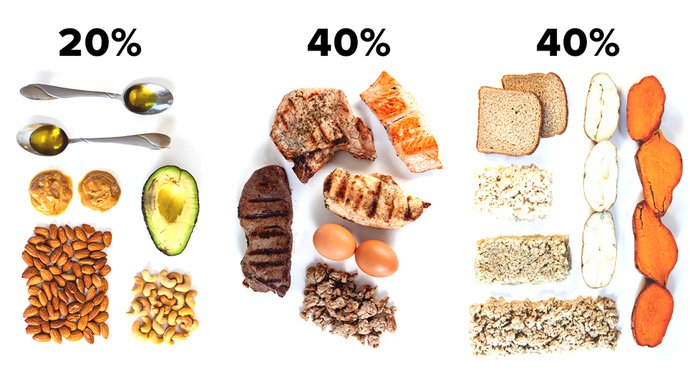Technically, you could experience some success by only counting the number of fast-food hamburgers you eat each day and decreasing it by one. However, if you would like to experience lasting changes to your body, stay healthy, and increase your fitness, it can be helpful to look more deeply into how much of each macronutrient you're consuming.
There are three primary macronutrients (macros): carbohydrates, fat, and protein. Each of them is necessary for your health and performance, but there are endless ways to combine them. For carbohydrates alone, your options range from a very low-carb ketogenic diet where you eat next to no carbs and lots of fats, to carb cycling, where you change your carb intake day by day based on your training schedule.
These days it's pretty easy to do a quick internet search and find hundreds of different diet plans of varying complexity and extremity. But to start off, it's best for most people to keep a good ratio of all three macros in your nutrition plan and simply focus on quality and consistency.

Most American diets are too heavy in fat and carbs and don't have enough protein. A tried-and-true ratio to start with to get these imbalances under control is:
- 20 percent of your calories from fat
- 40 percent from carbs
- 40 percent from protein
Use Bodybuilding.com's free macronutrient calculator to help you find what works best for you and your lifestyle. Over time, you can make alterations to this ratio depending on what foods you like, how your body responds, and your daily activity level.
For example, fitness model and trainer Obi Obadike says he ultimately landed on a 20/30/50 split for lasting leanness while still being able to perform in the gym. Other coaches and athletes have had success with 30/30/40, 25/35/40, or other ratios entirely.
Honestly, there's a lot of room for customization when it comes to fats and carbs, as long as you keep two factors more or less consistent: overall calories and daily protein intake. Those two factors are the numbers that studies have shown to be most connected to dieting success, explains registered dietician Susan Hewlings, Ph.D., in the video "How to Eat for Weight Loss" in Bodybuilding.com's Foundations of Fitness Nutrition course.
"Here's the thing: As long as calories—i.e., total portions—are under control and you're getting enough protein, [dietary systems] all work with about the same level of predictability," Hewlings says.
Having a balanced nutrition plan will not only help you lose weight, it will help you be able to maintain it for the long term. It may not sound sexy, but maintenance—i.e., not yo-yoing—is an essential part of losing fat and keeping it off.


